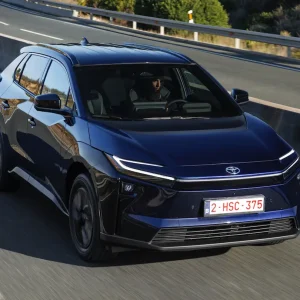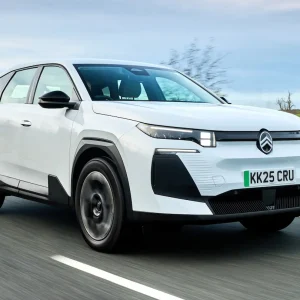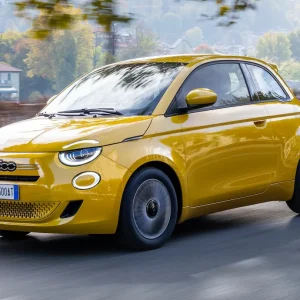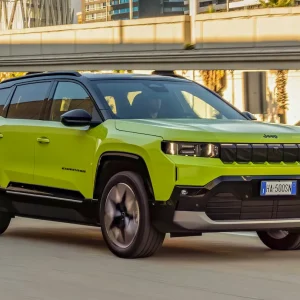Volkswagen was quick off the mark with its all-electric ID range of cars. First came the ID.3 hatch, then in quick succession followed the ID.4 SUV. There’s also a curvier coupe-like version of the ID.4 incoming called the ID.5, with the Skoda Enyaq Coupe, that’s also reviewed in this issue, in its sights. With sportier versions of sister models, the Audi Q4 E-Tron and the aforementioned Enyaq already available, Volkswagen has responded with the sportiest version of the ID.4 and given it an iconic badge – GTX. It is a significant badge, as GTX will be to its ID models what GTi is to its petrol-engined models such as the Golf.
Sadly, with this ID.4, it seems to be all about the badge, rather than making distinctive exterior changes – like GTis past. Maybe the GTX-look will be developed for future models – but this time round it just doesn’t look different enough from the standard ID.4 to us. That’s not to say that the ID.4 doesn’t have an attractive SUV design, but apart from the revised matrix LED front headlights, the distinctive LED rear lights, slightly lowered stance and new 20in alloys, it looks like any other ID.4.
Inside, the GTX treatment makes the spacious, uncompromised interior of the ID.4 feel a bit more special. Our test car had the Comfort seats, but they were smartly finished in velour trim, with bold stitching. Go for the Max trim, and you’ll get the more supportive, one-piece Sports Plus seats, which we feel would suit the GTX image better. Still, even with the standard seats, the leather dash trim and GTX-badged steering wheel, this ID.4 interior is still a bit stark, although these token changes do make you feel you’re driving something a bit more special.
Shame then, that the infotainment is still difficult to operate, with too many menus and duff sliders. Plus, this is the second ID model with electrical issues – this time the rear child locks failed on the test car locking my children in.
As with the standard ID.4, it’s built on VW’s dedicated MEB platform, although like the Audi Q4 E-Tron 50 Quattro long-termer I’ve been running recently, and the forthcoming Skoda Enyaq vRS, the GTX gets an extra motor on the front axle, boosting power to a hot-hatch rivalling 299hp. The result is 0-62mph in 6.2 seconds and a top speed of 112mph.
Fitted with the same 77kWh battery as ID.4 Pro Performance models, according to Volkswagen, the GTX can travel up to 301 miles on a single charge. This seems believable, as we got around 240 miles to a charge during cold winter weather. Choose a 125kW rapid charger (if you can find one) and 199 miles of range can be added in just 30 minutes, while a 7.2kW home charger takes around 12 hours and 40 minutes to take the battery from 0% to 100%.
Being the first sporting EV model with a badge that we’re sure Volkswagen is hoping will be as iconic as the GTi, you’d think it would have made more changes to the way this faster ID.4 drives. But, like the standard car, the GTX is a fairly neutral handler, with decent body control and plenty of extra grip thanks to the second motor and four-wheel drive. However, that extra grip is the only thing that marks the GTX out against the standard car, the steering has more weight to it – but still doesn’t have enough feel for what is claiming to be a sportier EV. The throttle response is tepid and gives little away when starting off, that this ID.4 has almost 300hp. We found the lack of engine noise, like other EV rivals, leaves you feeling rather detached from the experience. So to sum up, despite a “Sport” mode, there is no more engagement here than with the standard car. If you’re looking for that driver engagement, you might be better off with a Ford Mustang Mach-E instead.
Compared with a similar Q4 E-Tron ,however, we preferred the GTX’s more comfortable handling/ride balance. It was noticeably more comfortable at low speeds and around town than the Audi.
The GTX is probably the best of the ID.4 models on sale, but it doesn’t feel as special in the same way the performance GTi does, to a standard Golf. Drive this ID.4 without the hang-ups of the performance badge, and it’s a great all-rounder, with the added security of four-wheel drive meaning you can at least make the most of the extra performance, more of the time.
Volkswagen ID.4 GTX
P11D: £50,485
Residual value: 46.6%
Depreciation: £26,911
Fuel: £2,853
Service, maintenance and repair: £2,302
Cost per mile: 53.44p
Electric range: 306 miles
CO2 (BIK %): 0g/km (2%)
BIK 20/40% a month: £17/£34
Luggage capacity: 543 litres
Engine size/power: 77kWh/299hp





